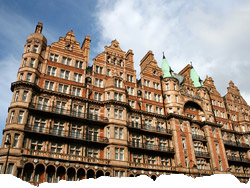
“Why did I feel so warm and fuzzy inside?”
It was exam time for university kids, and my life had gotten significantly boring. I was studying in the school library all day, and it was time to walk back from the Russell Square campus to my dorm in King’s Cross. On days like these, after working my brain so hard, doing the sudoku in thelondonpaper[1] was a welcome treat.
Every day at evening rush hour, there were two spots where the free evening papers were distributed: thelondonpaper in front of the burger stand, and London Lite behind Tesco. I made a mental note of the spots, and walked in a hurry. I always had to fight against a lot of people to get a copy. The paper distributors were puffy in their big jackets, yet their hands were still bare. I’ve done those part time jobs before, handing things out on the streets[2], and I know that gloves get in the way.
One by one, people took the papers and replied ‘thank you’. A woman in a red coat in front of me grabbed one and said ‘thank you, darling’. ‘Darling.’ A complete stranger was still a darling. I felt really warm and fuzzy inside.
Why did I feel so warm and fuzzy inside? Because when I was handing things out in Tokyo, nobody ever said thank you, and so I was amazed, and really appreciated the fact that people would say something like that in London. But to add ‘darling’ to it, that just made it even sweeter, and showed that sometimes strangers care about other strangers.
referenced works
- Thelondonpaper is one of several free newspapers handed out to commuters by armies of uniformed distributors every morning. Until 2006, the Metro was London’s only major free newspaper, but the last year has seen a rash of rival publications, each backed by one of the major news corporations. The two biggest competitors are thelondonpaper (published by the delightful Rupert Murdoch’s equally delightful News International) and London Lite (published by Associated Newspapers, home of the heartwarming Daily Mail). ↩
- Although at the time of going to print, Tokyo lacks armies of free newspaper distributors, it more than makes up for them with distributors of various other freebies, mostly in the form of free tissues advertising various products and services. While, as Yuki’s story demonstrates, the English tend to show their gratitude in the form of an occasional terse nicety, the following article suggests that the Japanese show theirs by dutifully reading the advertising, and presumably buying a lifetime’s supply of whatever tat is being peddled. ↩
location information
- Name: Russell Square station
- Address: Russell Square, London
- Time of story: Evening
- Latitude: 51.523003529077705
- Longitude: -0.12471199035644531
- Map: Google Maps

commentary
You couldn’t understand the routes — maybe?
…I always had to fight against a lot of people to get a copy…
Really? Are you sure? I get the same free paper — in the same place —
and I never have to fight, to get a copy.
Actually, is the opposite — the paper distributors are desperate
to give you a copy — so they can go home faster.
…lots of burglars and violence and the like…
Really? I live very close to your described spot, and I never experienced any problem — maybe you attract attention to yourself?
Maybe too much paranoia? Maybe you read an exaggerated article back home?
You really seem to exaggerate your descriptions.
I give you a suggestion — try to be less superficial and more analytical.
Cheers :: London
Can I make a suggestion to your good self M2 - that you try to be less nitpicky and more nice-guyey?
‘Twill not hurt a bit, and, since you presume to write on behalf of London as a whole, it will make us seem less like boggle-eyed reactionaries who will spit venom at the mere suggestion that our city is less than perfect.
The foibles of our transport system are extensively documented, free papers tend to be handed out in crowded spots, and as such, the image of ‘fighting to get one’ is perfectly valid, regardless of the attitude of the distributor, and it is hardly charitable to suggest to a young woman alone in a city that is undeniably dangerous at times that her understandable dislike of said danger is merely ‘paranoia’.
May I humbly suggest that would-be hitotoki commenters err on the side of charity, unless it is to point out a failure on my part to give the lovingly-crafted writings the attention and credit that they deserve.